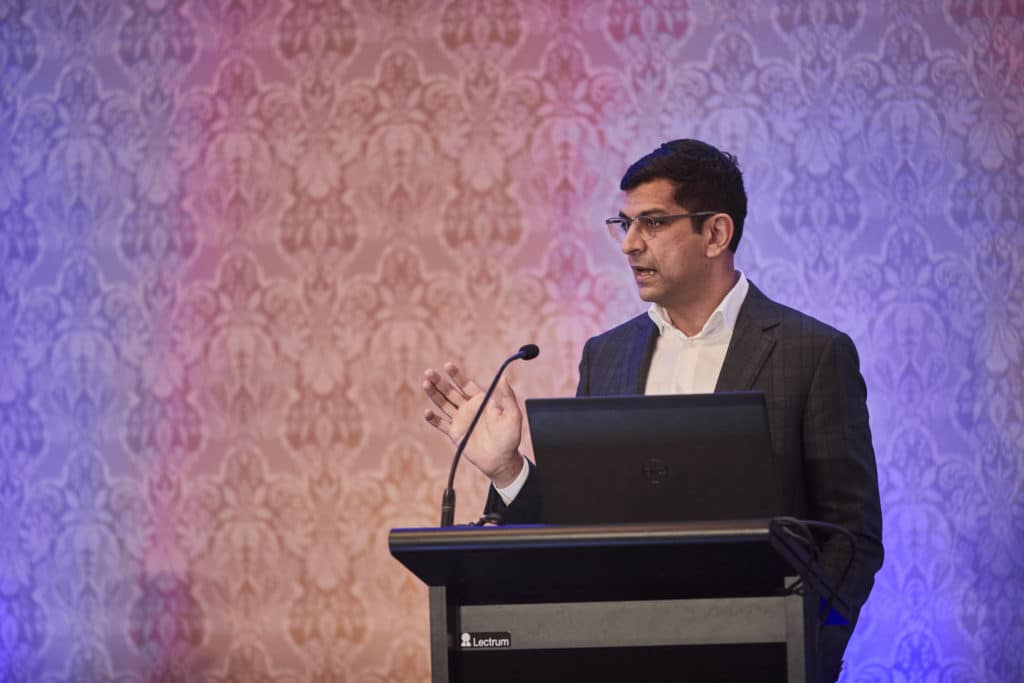What are CDK4/6 Inhibitors?
CDK4/6 inhibitors are a class of drugs that are being given to patients in order to treat certain types of breast cancer and have been proven to help stop the division of cancer cells.
Breast Cancer Trials has been directly involved with research into CDK4/6 inhibitors since they were introduced in 2015. With Palbociclib being the first drug. These trials include Penelope B, PALLAS, PATINA, and the Paloma 2 trial which led to the registration and PBS listing of Palbociclib.
Dr Shom Goel is a clinician-scientist at the University of Melbourne and Peter MacCallum Cancer Centre, with a strong interest in translational breast cancer research. He was a guest speaker at the 2022 Breast Cancer Trials Annual Scientific Meeting. And we asked Dr Goel to explain his research into CDK4/6 inhibitors and where research is going in the future.
“CDK4/6 is a long-winded name, but essentially these are tablets that people can take at home that have been shown to help stop cancer cells from dividing. That’s the primary way that they work.”
“And at the moment we have found that if we combine those CDK4/6 inhibitors with hormonal therapy, this is for patients who have breast cancer that’s called hormone receptor positive (HR+), it significantly improves outcomes for patients compared to giving hormone therapy alone.”
“So, in that subgroup of patients, these drugs have really been a game changer. At the moment we use them mainly for patients with what we call advanced hormone receptor positive breast cancer. That means cancer that spread to other parts of the body. But we are looking to see whether they could also be useful in early-stage disease.”
Listen to the Podcast
Listen to our conversation with Dr Shom Goel as he discusses the CDK 4/6 Inhibitors.
‘Making the Most of a Good Thing’
“So, my presentation is called ‘CDK4/6 Inhibitors – Making the Most of a Good Thing’. I’m talking about that topic because that is what my laboratory research is all about. I say ‘a good thing’ because I think these drugs really have dramatically improved outcomes for many women with breast cancer.”
“And I say, ‘making the most of’ because I think there’s still a lot more we can do to bring these treatments to more women and see better outcomes for patients in different settings, or even with different subtypes of breast cancer.”
“What’s really interesting about these drugs is that they work by stopping cancer cells from dividing. But our research has also shown that they can boost the immune system’s attack against the cancer. And we think that’s why they might be particularly interesting drugs for patients with triple-negative disease.”
Where is Research Going in the Future with CDK4/6 Inhibitors?
“It’s a really exciting time for this class of drugs. They’re clearly here to stay which is great. And so now it’s upon us as researchers to find out how we can use them better. I’d say the first thing that’s coming, is the introduction of these drugs in what we call the early-stage breast cancer setting. So, this is not only about treating patients with advanced disease but now using these drugs to try and prevent breast cancer recurrence and increase people’s chances of a long-term cure.”
“And the second thing that I think is really exciting, are attempts to bring these drugs to patients with other subtypes of breast cancer. So, we talk about another subtype called HER2-positive breast cancer.”
“There have already been clinical trials looking at CDK4/6 inhibitors in that patient group, some of which Breast Cancer Trials was heavily involved with. And we’re just waiting to see if those trials look good, and we’re optimistic.”
“There are even trials which I’m involved with seeing whether we might be able to use these drugs for patients with what’s called triple-negative breast cancer.”
Support Us
Help us to change lives through breast cancer clinical trials research



